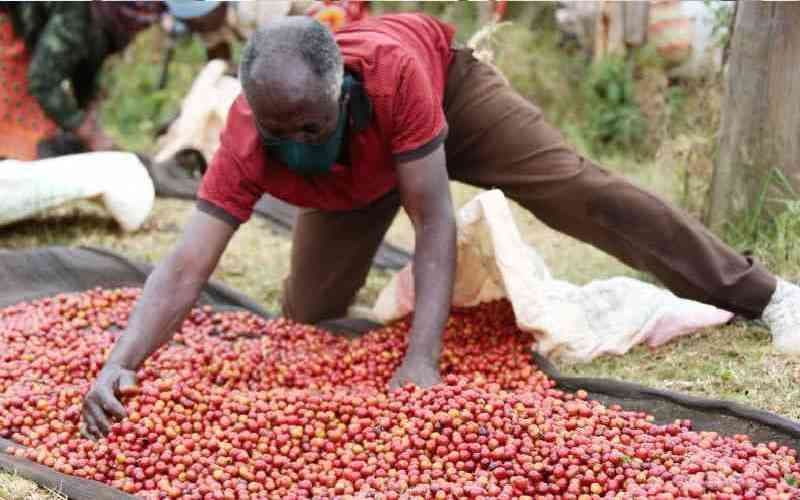We're loading the full news article for you. This includes the article content, images, author information, and related articles.
A significant drop in coffee bags offered at the weekly auction led to a 27% revenue decrease, raising concerns over production consistency despite resilient per-bag prices for farmers.

Total earnings at the Nairobi Coffee Exchange (NCE) fell to KSh 411.8 million during the weekly auction on Tuesday, October 28, 2025, a sharp 27% decline from the KSh 565.4 million recorded the previous week. The drop is primarily attributed to a lower volume of coffee presented for sale, with 7,135 bags auctioned compared to 8,674 bags in the prior week's trading session, according to an official NCE report.
Despite the lower overall revenue, the market showed underlying strength with the average price per 50kg bag recorded at USD 357. This performance highlights sustained demand for Kenyan coffee, particularly for premium grades which continue to fetch competitive prices from international buyers. The highest price achieved during the auction was USD 475 for a consignment of AA-grade beans from the Kiamariga Factory in Nyeri County, which was marketed by Alliance Berries Limited. Other top-performing factories included Kabunyeria, Lucas Estate, and Menu Estate, with prices for their AA grades reaching KSh 60,853, KSh 60,336, and KSh 59,173 per bag, respectively.
Ten licensed brokers participated in the auction, with Alliance Berries Ltd and New KPCU PLC leading in volumes. Alliance Berries traded 1,346 bags valued at KSh 76.5 million, while New KPCU sold 1,300 bags for KSh 75 million. Other significant brokers included Kirinyaga Slopes Coffee Brokerage Co. Ltd, which auctioned 891 bags for KSh 53.6 million, and Kipkelion Broker Company Ltd, which traded 872 bags.
On the buying side, the market was dominated by a few major players. Sixteen buyers participated, with Ibero Kenya, Louis Dreyfus Company, and Taylor Winch collectively purchasing the majority of the coffee on offer. Ibero Kenya was the top buyer, acquiring 1,633 bags, followed by Louis Dreyfus with 1,537 bags and Taylor Winch with 1,155 bags. This concentration of buyers underscores their critical role in driving Kenya's coffee trade.
This week's auction results come amidst a concerted push by the Kenyan government to implement sweeping reforms in the coffee sector. These reforms, driven by the office of the Deputy President and overseen by the Capital Markets Authority (CMA), are designed to enhance transparency, dismantle cartels, and ensure farmers receive a larger share of the profits. Key initiatives include the operationalization of a Direct Settlement System (DSS) to ensure prompt payment to farmers within 72 hours of a sale and the restructuring of licensing protocols for millers, brokers, and marketers.
The government aims to increase national coffee production from the current 50,000 metric tonnes to over 200,000 tonnes within five years through measures like distributing subsidized seedlings and fertilizers. The recent performance at the NCE, where higher quality grades like AA and AB consistently command premium prices, aligns with the government's call for farmers to focus on quality to maximize returns. NCE Chief Executive Officer Lisper Ndung'u encouraged farmers to continue utilizing the online trading platform to benefit from competitive pricing.
The solid prices for top-tier Kenyan coffee also reflect positive global market dynamics. Tightening supplies and weather-related disruptions in Brazil, the world's largest arabica producer, have kept international prices elevated. This trend has benefited East African producers, with exporters receiving stronger bids from international buyers. As the main Kenyan harvest season progresses, the focus will remain on whether increased volumes can be brought to the auction to capitalize on this favorable global pricing environment, thereby boosting overall earnings for the country and its farmers.
Keep the conversation in one place—threads here stay linked to the story and in the forums.
Sign in to start a discussion
Start a conversation about this story and keep it linked here.
Other hot threads
E-sports and Gaming Community in Kenya
Active 9 months ago
The Role of Technology in Modern Agriculture (AgriTech)
Active 9 months ago
Popular Recreational Activities Across Counties
Active 9 months ago
Investing in Youth Sports Development Programs
Active 9 months ago